
Overview
Proper maintenance and repair of Detroit Diesel V71 engines require a variety of specialized tools to ensure precision, efficiency, and safety. These tools are critical for performing tasks such as disassembly, inspection, cleaning, and reassembly of engine components. This section provides a comprehensive list of the tools required for servicing the V71 series engines, along with their functions and specific applications for lubrication and cooling systems.
Using the correct tools minimizes the risk of damage to engine parts and ensures adherence to factory specifications, prolonging the life and performance of the engine.
Tools For Working On Detroit Diesel 6V71 Engines
Tools For Working On Detroit Diesel 8V71 Engines
Tools For Working On Detroit Diesel 12V71 Engines
Tools For Working On Detroit Diesel 16V71 Engines
Comprehensive List of Tools for Maintenance
The following categories outline the essential tools used in the maintenance of Detroit Diesel V71 engines:
-
General Maintenance Tools

Fuel Line Socket For Detroit Diesel Engines
These tools are commonly used for a wide range of maintenance tasks:
- Torque Wrenches:
- Used to apply precise torque to fasteners. Essential for tightening bolts to manufacturer-specified torque values.
- Used to apply precise torque to fasteners. Essential for tightening bolts to manufacturer-specified torque values.
- Socket Sets and Wrenches:
- Include a range of sizes for various fasteners throughout the engine. Metric and SAE sizes are both necessary.
- Include a range of sizes for various fasteners throughout the engine. Metric and SAE sizes are both necessary.
- Screwdrivers:
- Used for loosening and tightening screws on covers, clamps, and other components.
- Used for loosening and tightening screws on covers, clamps, and other components.
- Pliers:
- Essential for gripping, cutting, and manipulating small parts such as hose clamps and wires.
- Essential for gripping, cutting, and manipulating small parts such as hose clamps and wires.
- Hammers (Rubber and Ball-Peen):
- Used for tasks like seating gaskets and aligning parts without causing damage.
- Used for tasks like seating gaskets and aligning parts without causing damage.
- Dial Indicators and Calipers:
- Provide precise measurements of tolerances and clearances during inspection.
- Provide precise measurements of tolerances and clearances during inspection.
-
Specialized Tools for Lubrication System
Maintaining the lubrication system requires tools designed to handle the unique challenges of oil circulation and pressurization.
- Oil Pump Removal Tool (J 22397):
- Used to safely remove the oil pump without damaging the gear or crankshaft.
- Used to safely remove the oil pump without damaging the gear or crankshaft.
- Oil Pressure Tester:
- Measures oil pressure to verify proper operation of the lubrication system.
- Measures oil pressure to verify proper operation of the lubrication system.
- Seal Puller:
- Removes old oil seals from pump housings or crankshaft covers.
- Removes old oil seals from pump housings or crankshaft covers.
- Oil Filter Strap Wrench:
- Used for removing spin-on or canister-style oil filters.
- Used for removing spin-on or canister-style oil filters.
- Bearing Pullers and Drivers:
- Extracts and installs bearings in the oil pump and other components.
- Extracts and installs bearings in the oil pump and other components.
- Oil Gallery Cleaning Brushes:
- Cleans oil passages to remove sludge and debris, ensuring unrestricted flow.
- Cleans oil passages to remove sludge and debris, ensuring unrestricted flow.
-
Specialized Tools for Cooling System
The cooling system requires precision tools for tasks like cleaning, testing, and assembling components.
- Radiator Pressure Tester:
- Tests the radiator and cooling system for leaks by applying controlled pressure.
- Tests the radiator and cooling system for leaks by applying controlled pressure.
- Thermostat Testing Tool:
- Ensures thermostats open and close at the specified temperatures.
- Ensures thermostats open and close at the specified temperatures.
- Water Pump Pulley Puller (J 22399):
- Facilitates removal and installation of the water pump pulley without damaging it.
- Facilitates removal and installation of the water pump pulley without damaging it.
- Heat Exchanger Cleaning Brushes:
- Used to remove scale and debris from the tubes of marine heat exchangers.
- Used to remove scale and debris from the tubes of marine heat exchangers.
- Coolant Hydrometer:
- Measures the concentration of antifreeze and ensures proper coolant mixture.
- Measures the concentration of antifreeze and ensures proper coolant mixture.
- Cooling System Flushing Kit:
- Connects to the system to flush out contaminants using water or cleaning agents.
- Connects to the system to flush out contaminants using water or cleaning agents.
-
-
Tools for Cylinder Head and Valve Train
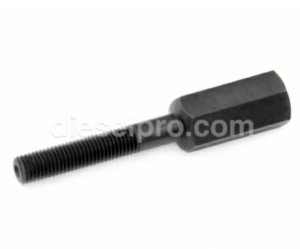
Kent Moore flaring die for Detroit injector tube installation
- Valve Spring Compressor (J 8062):
- Compresses valve springs for safe removal and installation of valves.
- Compresses valve springs for safe removal and installation of valves.
- Injector Timing Tool:
- Used to set precise timing for fuel injectors to ensure proper engine performance.

To Select The Correct Timing Tool For Your Injector On Dieselpro.com Simply Add Your Injector To The Shopping Cart & Our System Will Recommend The Correct Timing Tool
- Used to set precise timing for fuel injectors to ensure proper engine performance.
- Rocker Arm Shaft Removal Tool:
- Facilitates removal of the rocker arm shaft without damaging other components.
- Facilitates removal of the rocker arm shaft without damaging other components.
- Cylinder Head Bolt Wrench:
- Specially designed to access and torque head bolts in tight spaces.
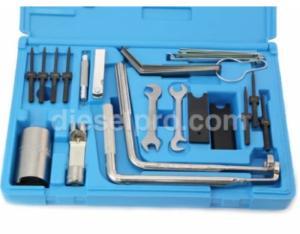
Detroit Diesel engine tune up kit for Detroit Diesel 71 series
- Specially designed to access and torque head bolts in tight spaces.
-
Tools for Crankcase and Pistons
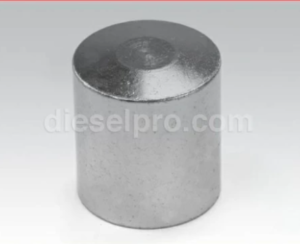
Detroit Diesel Tool to install the piston pin retainers. For 71 Series (with cross head pistons)
- Piston Ring Compressor:
- Compresses piston rings for easy insertion into the cylinder.
-
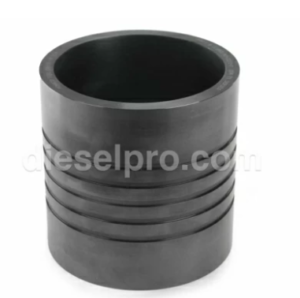
Detroit Diesel piston ring compressor for 6V71, 8V71, 12V71 and 16V71 engines
- Compresses piston rings for easy insertion into the cylinder.
- Cylinder Hone:
- Prepares the cylinder walls for new pistons by creating a crosshatch pattern.
- Prepares the cylinder walls for new pistons by creating a crosshatch pattern.
- Crankshaft Pulley Remover (J 24420-A):
- Safely removes the crankshaft pulley for access to the timing gear and front cover.
- Safely removes the crankshaft pulley for access to the timing gear and front cover.
- Depth Micrometer:
- Measures piston height, liner protrusion, and crankshaft endplay.
- Measures piston height, liner protrusion, and crankshaft endplay.
Functions of Specific Tools
Each tool plays a vital role in the maintenance process. Below are examples of how some key tools are used:
-
Torque Wrench:
- Ensures bolts are tightened to precise specifications, critical for maintaining proper sealing and structural integrity.
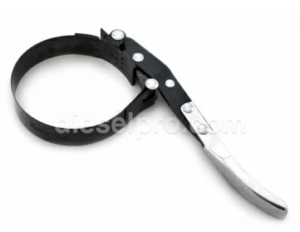
Fuel Filter Removal Wrench for Detroit Diesel
-
Dial Indicator:

Technician Uses A Starrett Dial Indicator To Measure The Backlash Between The Gears
- Measures endplay in components like the crankshaft and camshaft. Used for setting clearances with micrometer precision.
-
Pressure Tester:
- Detects leaks in oil and cooling systems, preventing damage caused by pressure loss or overheating.
-
Injector Timing Tool:
- Aligns the injectors with the camshaft to ensure accurate fuel delivery, improving combustion efficiency.
-
Piston Ring Compressor:
- Simplifies piston installation while protecting rings from damage during insertion.
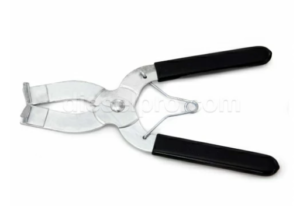
Maintenance Tools for Lubrication and Cooling Systems
For Lubrication Systems:
- Oil Pressure Tester:
- Verifies that oil pressure meets the required specifications, preventing engine wear caused by insufficient lubrication.
- Verifies that oil pressure meets the required specifications, preventing engine wear caused by insufficient lubrication.
- Seal Installation Tool:
- Ensures proper placement of seals in the oil pump and crankshaft to prevent leaks.
- Ensures proper placement of seals in the oil pump and crankshaft to prevent leaks.
- Bearing Puller and Driver Set:
- Facilitates the removal and installation of oil pump bearings without damaging surrounding components.
- Facilitates the removal and installation of oil pump bearings without damaging surrounding components.
For Cooling Systems:
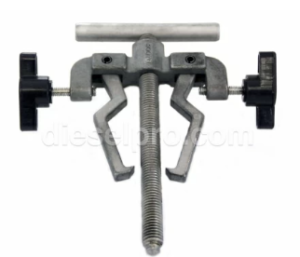
- Thermostat Testing Tool:
- Checks thermostat functionality by simulating operating temperatures.
- Checks thermostat functionality by simulating operating temperatures.
- Radiator Pressure Tester:
- Identifies leaks in the radiator or water passages by applying controlled air pressure.
- Identifies leaks in the radiator or water passages by applying controlled air pressure.
- Flushing Adapters:
- Connect to coolant hoses to flush the cooling system with cleaning solutions or pressurized water.
- Connect to coolant hoses to flush the cooling system with cleaning solutions or pressurized water.
Tool Selection and Best Practices
Proper selection and use of tools are essential for successful maintenance:
- Use Manufacturer-Approved Tools:
- Ensure tools meet Detroit Diesel specifications for compatibility and reliability.
- Ensure tools meet Detroit Diesel specifications for compatibility and reliability.
- Maintain and Calibrate Tools Regularly:
- Calibrate torque wrenches and pressure testers periodically to ensure accuracy.
- Calibrate torque wrenches and pressure testers periodically to ensure accuracy.
- Store Tools Properly:
- Prevent rust and wear by storing tools in a clean, dry environment.
- Prevent rust and wear by storing tools in a clean, dry environment.
- Replace Worn or Damaged Tools:
- Avoid using tools that are worn or damaged, as they can compromise precision or safety.
- Avoid using tools that are worn or damaged, as they can compromise precision or safety.
- Follow Safety Guidelines:
- Wear appropriate protective gear, such as gloves and eye protection, when working with tools.
- Wear appropriate protective gear, such as gloves and eye protection, when working with tools.
Summary
The correct tools are a vital part of maintaining and servicing Detroit Diesel V71 engines. This comprehensive guide ensures that technicians have the information they need to select and use tools effectively, improving maintenance outcomes and preserving engine performance. Proper use of these tools reduces the risk of damage, extends the life of engine components, and ensures that all repairs meet factory specifications.
By investing in the right tools and following best practices, operators and technicians can maintain the legendary reliability of Detroit Diesel V71 engines in any application.
Tools For Working On Detroit Diesel 6V71 Engines
Tools For Working On Detroit Diesel 8V71 Engines
Tools For Working On Detroit Diesel 12V71 Engines
Tools For Working On Detroit Diesel 16V71 Engines



 Free US Calls: 1-888-433-4735
Free US Calls: 1-888-433-4735 International: 305-545-5588
International: 305-545-5588